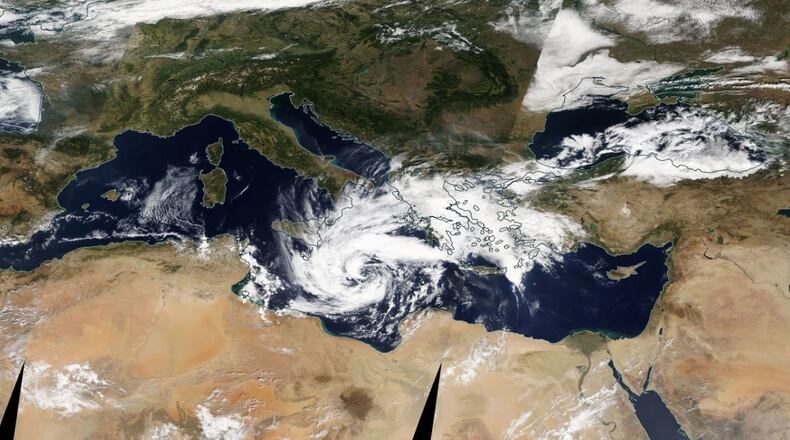However, a storm in the Pacific Ocean named Rosa is sending a lot of Pacific moisture into the southwestern United States, prompting flood watches and warnings in many areas from Arizona, Nevada and into Utah.
» READ MORE: Sugarcreek residents oppose new proposal for homes
It will likely be another two months before tropical weather season completely comes to an end. Even though surface air temperatures are cooling with the arrival of fall, it takes large bodies of water more time to cool. The result is a delay in the end active tropical development. Hurricane season officially ends Dec. 1 in the northern hemisphere.
In the southern hemisphere, cyclone season will just be ramping up. Of course, cyclones are the same as hurricanes, they just have a different name in the southern hemisphere.
Such tropical systems go by a variety of names in the northern hemisphere. For the Atlantic Ocean and eastern Pacific Ocean (east of the international date line), we call intense tropical systems with 75 mph or greater sustained wind speeds, hurricanes. In the western Pacific, and around eastern Asia, the storms are called typhoons.
» NEW DEVELOPMENT: Woman faces murder charge after Dayton man killed, found wrapped in plastic in bathroom
Late last week, an unusual tropical system formed over the northeastern Mediterranean Ocean. Such a system has been given the term “medicane” — short for Mediterranean hurricane.
Typically, tropical systems do not form in this area since the open waters of the Mediterranean are much less than the giant ocean basins of the Atlantic, Pacific and Indian Oceans, lending itself to a much drier environment.
However, there have been around 100 of these so called medicanes reported since 1941. The development of these tropical-like cyclones in the Mediterranean can occur year-round, with activity historically peaking between the months of September and January.
Several notable and damaging medicanes are known to have occurred. In September 1969, a North African Mediterranean tropical cyclone produced flooding which killed nearly 600 people, left 250,000 homeless, and severely impacted the local economies.
» READ MORE: Grocery, housing, community center ‘signs of hope’ for Dayton neighborhood
A medicane in September 1996 that developed just off the east coast of Spain spawned six tornadoes and inundated parts of the Balearic Islands.
Several medicanes have also been subject to extensive study, such as those of January 1982, January 1995, September 2006, November 2011 and November 2014. The January 1995 storm is one of the best-studied Mediterranean tropical cyclones, with its close resemblance to tropical cyclones elsewhere and availability of observations.
The medicane of September 2006, meanwhile, is well-studied due to the availability of existing observations and data. In November 2011, the NOAA’s Satellite Analysis Branch monitored a medicane which the University of Berlin named “Rolf.” However, the University stopped naming medicanes a month later.
» TRENDING: Sales tax increase in Montgomery County: What gets taxed and what doesn’t?
In 2015, the NOAA began issuing advisories for tropical systems in the Mediterranean region. Over this past weekend, such a storm has killed at least four people in Tunisia due to flooding rains. Additional fatalities and significant damage have been reported in Greece and Turkey.
So the next time you hear the term medicane, you’ll know that isn’t a new health insurance program you need to sign up for, but some crazy weather going on in another part of the world.
Needless to say, it won’t be just the folks along U.S. coastlines who will be glad to see tropical season come to an end this year.
About the Author
